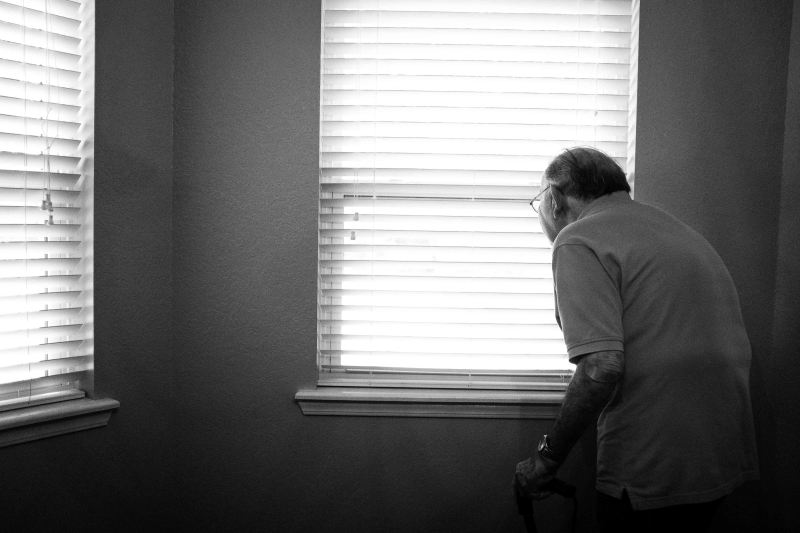On Sunday afternoons, I bike three miles to a quaint wooden house in a quiet neighborhood in Menlo Park. The house is adorned with pink shutters and a turquoise door, and the front yard garden is overgrown with lavender bushes and beautiful trails of flowering vines. Each week I park my bike in the driveway next to an old mailbox and an animal cage and ring the doorbell. I’m greeted by a caretaker, who punches in a four-digit code to unlock the front door and let me inside.
It smells like urine inside, and I am not sure if the odor comes from the cats or from the people who own the house. I take a seat at the living room table on a cushioned window bench. On a good day, both of my companions are seated at the table, eating a snack or reading the cartoons in the newspaper. Sometimes, one lies prostrate on the couch, taking a nap in an uncomfortable-looking position. For the next hour, we chat, listen to music and make a puzzle or play with dominoes or assemble paper airplanes.
My companions are an elderly couple who suffer some of the worst symptoms of aging. The wife has late-stage dementia, and her husband has Parkinson’s disease. The husband, though evidently suffering cognitive decline, is able to hold a cogent conversation on personal topics — he explained to me that he once worked as an auto mechanic, and later as a computer technician at the Stanford Bookstore. His wife, however, has unfortunately lost all touch with reality. She may be seen having an argument with a rocking chair one minute and criticizing the police for a fabricated criminal mishandling the next. She oscillates between contented babbling and overt irritation at my presence in her home.
Working with this elderly couple has been a difficult experience, both practically and emotionally. On a practical level, it’s hard to navigate a relationship with a person who is no longer able to understand that you, too, are a human being. How do you talk to someone who can’t understand the words you’re saying? How do you respond to their incomprehensible requests and comments? How do you assert your authority as the “adult in the room” while respecting their human dignity and autonomy?
These are questions that I have yet to answer for myself, which must be answered on a case-by-case basis. As an eighteen-year-old with far less life experience than my clients, playing an authoritative role can be hard to do; it feels disrespectful and wrong to assert myself as the “adult in the room” when, according to age, I’m clearly the child. I am still learning how to negotiate the balance between respect and authority, deference and firmness, child and adult.
On an emotional level, working with an elderly couple has also given me ample opportunity to reflect on the reality of aging, mortality and meaning. Despite coming advances in medicine, it would be naïve to assume that dementia, Parkinson’s and other age-related diseases will be obsolete by the time I reach old age. As such, I have been forced to consider the fact that I too may be reduced to a mentally-impaired existence months or years before I actually die. This brings up a number of questions, namely about my identity and the things I care about beyond cognitive aptitude. When I am no longer able to do math or discuss social science research or even remember what I ate for breakfast, what will endure to give my life meaning?
I do not know what it is like to have dementia, so I cannot answer this question definitively. However, from my experience working with the elderly, I can provide two possibilities: aesthetics and relationships.
Thanks to the way music is stored in the brain, both husband and wife have extensive musical memory and can sing along to songs they probably haven’t heard in decades. Both have an appreciation for flowers and natural beauty and are proud of the interior decoration of their house. Though their minds have decayed with age, their senses are very much alive and receptive to all sorts of beauty. Building an appreciation for aesthetics and music early in life, then, may be a key to finding meaning and pleasure in life after cognitive decline.
Unsurprisingly, they also exhibit a tenderness towards each other that allows me glimpses of their married life before the diseases of old age. They do not always speak to each other lovingly — the wife in particular is prone to irritation — but they still address each other using playful nicknames and offer to help each other in the ways they know how. They are lucky to have each other to lean on through this process of aging, and I hope to have a network of long-loved individuals around me when I too near the end of life.
There is nothing romantic about aging. It is painful, humiliating and depersonifying. But I do not believe it has to be completely devoid of meaning. Just as we find beauty and happiness within the strain of everyday life, so too do the wife and husband I visit. Those moments of goodness may be more rare for them, but I hope that makes them all the more special.
Contact Avery Rogers at averyr ‘at’ stanford.edu.
